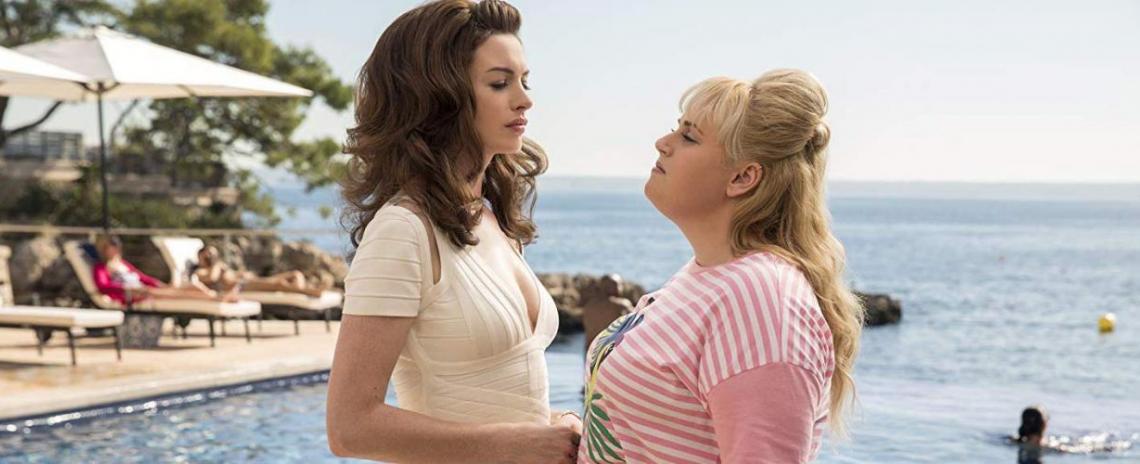One can’t begrudge the makers of The Hustle for wanting to update the Michael Caine and Steve Martin-starring cult comedy classic Dirty Rotten Scoundrels (1988) – itself a remake of the forgotten Bedtime Story (1964) with David Niven and Marlon Brando. This gender-flipped con-woman comedy could have been an opportunity to upstage last year's wan, neutered Ocean’s 8 by upending the 1988 film’s raunchy spectacle of despicable men and allowing women to relish the opportunity to do bad. Instead, the finished product is even more of a disappointment than the Ocean’s sequel: an unfunny, empty-minded cash-in on a (just) cultural shift towards more women’s stories, fiction and not.
The Hustle is ostensibly a vehicle for its star and producer, Rebel Wilson, the deadpan Aussie comedic actor known for scene-stealing in the Pitch Perfect franchise and in her breakout role in Bridesmaids (2011). It is with no joy to report that her low-level confidence woman, Penny, is largely an extension of the same familiar Wilson persona, complete with her laboriously extended scenes of the Apatow-ian faux-improvised bits that worked well in small bursts in her previous supporting work. Here, these moments – dead air that feels as if it takes up half the film’s runtime – are antithetical to what could be (or maybe should be) a screw-tight, hijinx-filled romp.
Not that Scoundrels was anything like a balletic, zany farce of peak Hawksian screwball, but the leaden The Hustle retroactively makes it seem so. This remake, however, does mostly follow its precursor’s narrative beats and cringe-worthy political incorrectness but with some choice technological updates. After her Tinder catfishing scheme – milking gross dudes for cash for her imaginary friend’s breast implant surgery – goes awry, Penny escapes to the South of France where she has a chance meeting with Josephine Chesterfield (Anne Hathaway). Josephine is, at first glance, a refined, erudite British society woman until she flaunts her own big-scale cons in an effort to dissuade Penny from infringing on her territory.
Having already portrayed an upper-crust criminal in the all-female Ocean’s reboot and cat-burglar par excellence Selina Kyle in Christopher Nolan’s The Dark Knight Rises (2012), Hathaway would seem perfect for the haughty and sly Josephine. Hamstrung by an easily excised British accent that she can’t quite master (and not to mention the tedious, by-committee script), this is unfortunately not the case. Hathaway comes off as stiff in the worst way through most of the film, save in for some setups for gags that run for far too long. Her swindle of a diamond engagement ring from Breaking Bad’s Dean Norris is an easy highlight – until the joke is repeated for the next 15 minutes of screentime.
Viewers might anticipate a twist in which Josephine is actually some country yokel putting on airs for her marks, but The Hustle goes beyond the obvious for the truly lowest-hanging fruit as it marches through the Scoundrels narrative. Josephine enlists Penny, but that too turns out to be a con. The two then go toe-to-toe by wagering on who can conquer supposed tech-wizard good-guy Thomas Westerburg (Alex Sharp) first. What drives this rote and predictable plotting is a sheen of “wokeness” that actually carries veiled strains of ableism (two cons hinge on Penny feigning disabilities) and homophobia. Josephine appears to be a lesbian – although her queerness is desexualized to the point of nonexistence – but queer people and queerness are the butt of several nuance-free jokes. Penny’s sexual openness thankfully goes without shaming, but it later falls prey to humdrum rom-com machinations.
The film’s director, Chris Addison, comes from the school of Armando Iannucci, having appeared as an actor in Iannucci’s British political farce The Thick of It (2005-12); its quasi-film adaptation, In the Loop (2012); and as a producer and director on Veep (2012-19). With The Hustle, that comedy lineage is in no way apparent, as the results lack even a modicum of the acerbic wit, screwball tendencies, or subversive schadenfreude of those works. Even at its lowest, Veep earns its acidity through its “nasty women” characters’ humanism, whereas The Hustle simply evaporates upon contact.
Rating: C-


